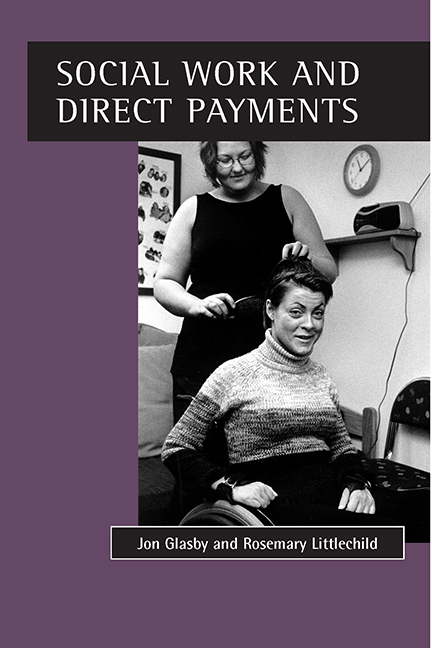Book contents
- Frontmatter
- Contents
- List of tables and boxes
- Foreword
- Acknowledgements
- List of abbreviations
- one Introduction
- two History
- three From indirect to direct payments I: legislation
- four From indirect to direct payments II: guidance and extension
- five The progress of direct payments
- six The experiences of different user groups
- seven The advantages of direct payments
- eight Possible difficulties
- nine Practical issues
- ten Conclusion: implications for community care
- Bibliography
- Appendix Useful resources
- Index
- Related reports from The Policy Press
two - History
Published online by Cambridge University Press: 05 April 2022
- Frontmatter
- Contents
- List of tables and boxes
- Foreword
- Acknowledgements
- List of abbreviations
- one Introduction
- two History
- three From indirect to direct payments I: legislation
- four From indirect to direct payments II: guidance and extension
- five The progress of direct payments
- six The experiences of different user groups
- seven The advantages of direct payments
- eight Possible difficulties
- nine Practical issues
- ten Conclusion: implications for community care
- Bibliography
- Appendix Useful resources
- Index
- Related reports from The Policy Press
Summary
To understand how fundamental the introduction of direct payments has been,it is necessary to have a basic awareness of the history of social work andits relationship with financial/poverty issues. As a result, this chapterbegins with a brief consideration of the origins of modern social work in19th-century philanthropy and the now notorious Poor Law, before providing amore detailed analysis of the build-up to the 1996 Community Care (DirectPayments) Act.
Social work and finance/poverty
The Charity Organisation Society
Social work, as a profession, has its origins in 19th-century philanthropyand in the pioneering approach of the Charity Organisation Society (COS)(Bosanquet, 1914; Rooff, 1972; Walton, 1975; Lewis, 1995). Founded in 1869by a group of individuals that included Octavia Hill, the renowned housingreformer and a founder member of the National Trust, COS was essentially areaction against a recent proliferation of philanthropic activity followingthe depression of the late 1860s. By offering charity to the poor, it wasargued, the rich were encouraging them to become dependent on alms andexacerbating rather than resolving the problem. For leading COS figures suchas Charles Loch or Helen Bosanquet, poverty was caused by individual andmoral failings – by fecklessness and thriftlessness. As a result, thesolution lay in individual casework, with a COS worker assessing whether anindividual was worthy or unworthy of assistance. For those deemed deserving,access to charitable resources might be permitted, although the emphasis wasstill very much on the need for moral reformation and for the individual tochange and improve their ways. For the undeserving, charity should be deniedand the applicant left to rely on the harsh mechanism of the Poor Law andthe workhouse. Although relatively little is known about the reaction of thepoor to this form of charity, it seems likely that many felt aggrieved bythis patronising and highly judgemental approach to poverty and reactedangrily to COS workers. Certainly when an East End clergyman and his wifesought to abolish almsgiving and establish a local COS, they were besiegedby an angry mob on more than one occasion. In the end, such demonstrationsbecame so widespread that the clergyman had to cut a door from the vicarageto his church so that he could slip out and fetch the police whenever themob gathered outside (Barnett, 1918, p 84).
- Type
- Chapter
- Information
- Social Work and Direct Payments , pp. 5 - 18Publisher: Bristol University PressPrint publication year: 2002

